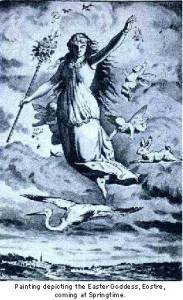 Eostre was a Germanic pagan deity, likely dating to Indo-European origins, and reflective of spring rebirth in northern European mythology. Jacob Grimm, of the Brothers Grimm, analyzed the linguistic and mythological origins of Easter and connected the modern beliefs to syncretization during European Christianization.
Eostre was a Germanic pagan deity, likely dating to Indo-European origins, and reflective of spring rebirth in northern European mythology. Jacob Grimm, of the Brothers Grimm, analyzed the linguistic and mythological origins of Easter and connected the modern beliefs to syncretization during European Christianization.
Still, Easter was about bunnies and fertility, with eggs representative of the latter. This was abstract symbolism. With syncretization, however, the traditions of human sacrifice drawn from Middle Eastern religion were overlain on the old forest beliefs about dawn and fertility. These sacrificial tendencies extend backward to the horrors of the Old Testament. We begin with Isaac and Jacob, but continue on to the genocide of the Amalekites by the Jews, including:
Thus says the Lord of hosts, “I have noted what Amalek did to Israel in opposing them on the way when they came up out of Egypt. Now go and strike Amalek and devote to destruction all that they have. Do not spare them, but kill both man and woman, and infant, ox and sheep, camel and donkey.” (1 Sam. 15:2-3)
Old Testament killing and sacrifice continues on and on:
…you must attack that town and completely destroy all its inhabitants, as well as all the livestock. Then you must pile all the plunder in the middle of the open square and burn it. Burn the entire town as a burnt offering to the Lord your God. That town must remain a ruin forever; it may never be rebuilt. (Deuteronomy 13:13-19)
If you give me victory over the Ammonites, I will give to the LORD the first thing coming out of my house to greet me when I return in triumph. I will sacrifice it [a daughter] as a burnt offering. (Judges 11:29-40)
This rampant cruelty extends into the New Testament where the ancient traditions conspire to produce the truly bizarre idea that we can escape our sins by God’s sacrifice of his own child. Somehow the Jews’ collective punishment for failing to follow complex Mosaic Laws, even after having once been drowned by God to the point of near extermination (The Noahic Flood), needed additional sacrifice to demonstrate our perfidy. But our collective moral failures are scapegoat-able (literally: an escape sacrificial goat); that is, our sins can be removed from us and absolved by Jesus who carried them back to Heaven by random cruelty by non-believers. Yet we remain sinners? Or, at least, the sin might be available for absolution by faith alone. Or acts and faith for some? It doesn’t make much sense and never really has. At least Eostre needs little explanation: the cycle of life continues.
Apparently, the urge to kill and sacrifice human lives was just getting back to basics:
You must give me the firstborn of your sons. Do the same with your cattle and your sheep. Let them stay with their mothers for seven days, but give them to me on the eighth day. (Exodus 22:29-30)
What a horrorfest. At least enjoy the eggs.